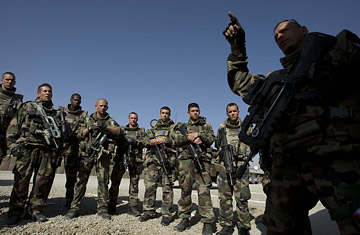
President Nicolas Sarkozy stated that France will soon rejoin NATO.
It is an episode of Gallic exceptionalism branded into the French national consciousness: in 1966, then-President Charles De Gaulle Charles De Gaulle flounced out of NATO's military command, declaring that Paris would never submit to outside influence on its defense policy.
Now, however, France appears ready to return to the NATO fold. On Tuesday, President Nicolas Sarkozy unveiled a 15-year military plan that aims to deepen France's involvement with its NATO and European allies in the fight against post-9/11 threats. And critically, he indicated that France will soon rejoin NATO's military command, even if its nuclear forces would remain under strictly national control. "We can renew our relations with NATO without fearing for our independence and without the risk of being unwillingly dragged into a war," Sarkozy said.
While France is a member of the 26-member NATO alliance, and takes part in all political decision-making bodies, it is not part of the integrated command structure. A return to NATO command would involve the appointment of French generals to NATO military headquarters and to the alliance's defense planning committee.
France has been creeping back toward NATO for more than a decade. Under President Jacques Chirac, Paris rejoined NATO's military committee of chiefs of staff in 1996, but the rapprochement was cut short after the U.S. refused to share more power with European countries in the integrated military structure.
Nonetheless, there has been a clear shift in French foreign policy toward a pro-U.S. stance since Sarkozy became President over a year ago. Dubbed 'Sarkozy l'Americain,' he has regularly underscored the importance of the Franco-American relationship.
"The move would be very political and symbolic," says François Heisbourg, a military expert and special adviser to the International Institute for Strategic Studies (IISS) in Paris. Heisbourg, who helped draft Sarkozy's military plan, predicted France would actually rejoin by the time of a Franco-German summit in March next year.
But any French step toward NATO would have be in line with the European Union's efforts to build up its own fledgling security and defense capacity, Heisbourg said. If France — the fifth largest contributor to NATO — becomes a more co-operative transatlantic ally, it is likely to find stronger backing for E.U. defense projects among NATO's European members. "If and when it happens, it would reflect the strides that had been taken in European security and defense policy," he says, adding that further steps on that policy are anticipated during the French presidency of the E.U., from July to December this year.
The new strategy also reflects how defense and security challenges have changed. Sarkozy said terrorism was the biggest threat to French security, and he pledged to create a leaner, more mobile and better-equipped army. He called for a doubling of the intelligence budget for new satellites, drones and other surveillance equipment — but plans to offset that by trimming the army, navy and air force from 271,000 troops to 224,000, with the army alone set for a 24% cut in personnel. Some 50 military bases, garrisons and other defense facilities are to be closed in a move that has already touched off protests in towns that fear economic hardship.
But if necessity has already pushed the French establishment to accept closer cooperation, public opinion lags behind. "This is much easier for the state and the military than it is for French public opinion," said Daniel Korski, senior fellow at the European Council on Foreign Relations. He said the powerful idea of France's military independence, enshrined in De Gaulle's walk-out, was belied by the depth of cooperation between Paris and NATO that had developed since the 1990s.
Korski says other factors are forcing Sarkozy's hand, as his defense budget cuts suggested. "It is generally acknowledged that the French state is close to scraping the barrel on finance, so cuts have got to be made. Policy and money go hand in hand," he says. In other words, if France is dropping its much-vaunted posture of independence on defense, it is — at least partly — because it cannot afford it anymore.
